
Kannada, previously also known as Canarese, is a Dravidian language spoken predominantly by the people of Karnataka in southwestern India, with minorities in all neighbouring states. It has around 44 million native speakers, and is additionally a second or third language for around 15 million non-native speakers in Karnataka.

Basava, also called Basaveshwara and Basavanna, was a 12th-century CE Indian statesman, philosopher, poet, Lingayat social reformer in the Shiva-focussed bhakti movement, and a Hindu Shaivite social reformer during the reign of the Kalyani Chalukya/Kalachuri dynasty. Basava was active during the rule of both dynasties but reached the peak of his influence during the rule of King Bijjala II in Karnataka, India.
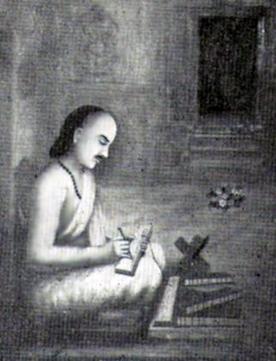
Narayanappa, known by his pen name Kumara Vyasa, was an influential and classical Vaishnava poet of early 15th century in the Kannada language. His pen name is a tribute to his magnum opus, a rendering of the Mahabharata in Kannada. Kumara Vyasa literally means "Little Vyasa" or "Son of Vyasa". He was the contemporary and archrival of the famous Veerashaiva poet laureate Chamarasa who wrote the seminal work Prabhulingaleele covering the lives of Allama Prabhu and other Shiva Sharanas, circa 1435. Both poets worked in the court of Deva Raya II.

Kanaka Dasa (1509–1609) was a Haridasa saint and philosopher, popularly called Daasashreshta Kanakadasa. He was a renowned composer of Carnatic music, poet, reformer and musician. He is known for his keertanas and ugabhoga, and his compositions in the Kannada language for Carnatic music. Like other Haridasas, he used simple Kannada and native metrical forms for his compositions.
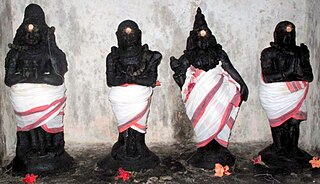
The Nayanars were a group of 63 Tamil Hindu saints living during the 6th to 8th centuries CE who were devoted to the Hindu god Shiva. Along with the Alvars, their contemporaries who were devoted to Vishnu, they influenced the Bhakti movement in early medieval South India. The names of the Nayanars were first compiled by Sundarar. The list was expanded by Nambiyandar Nambi during his compilation of material by the poets for the Tirumurai collection, and would include Sundarar himself and Sundarar's parents.

Mysore Shrinivas Sathyu is a film director, stage designer and art director from India. He is best known for his directorial Garm Hava (1973), which was based on the partition of India. He was awarded Padma Shri in 1975.
Krishna is a Hindu deity.

Devanahalli Venkataramanaiah Gundappa, popularly known as DVG, was an Indian writer, poet and philosopher in Kannada-language. He is one of the stalwarts of modern Kannada literature. His most notable work is the Mankuthimmana Kagga, which is similar to the wisdom poems of the late medieval poet Sarvajna.

Haveri is a district in the state of Karnataka, India. As of 2011, it had a population of 1,597,668, out of which 20.78% were urban residents. The district headquarters is Haveri.

Narahari Tirtha was a Dvaita philosopher, scholar, statesman and one of the disciples of Madhvacharya. He is considered to be the progenitor of the Haridasa movement along with Sripadaraja. Though only two of his scholarly works are extant, they are characterised by their verbosity and lack of digressions. A few songs of his survive under the pen name Raghukulatilaka. As a minister of considerable influence to the Eastern Ganga rulers and later as the pontiff of Madhvacharya mutt, Narahari converted the Simhachalam temple into an educational establishment of renown and a religious centre for Vaishnavism.

Gangaraju, professionally known as Hamsalekha, is an Indian film composer and songwriter who works in South Indian cinema, predominantly in the Kannada film industry since the late 1980s. He is also a screenplay writer, dialogue writer, instrumentalist and conductor, having composed and written over 500 albums.
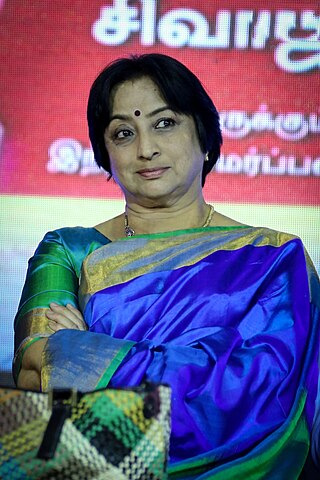
Yaragudipadi Venkata Mahalakshmi, known professionally as Lakshmi, is an Indian actress known for her works primarily in the southern film industry, along with some Hindi films. Her debut as a full fledged actress happened with the Tamil film Jeevanaamsam in 1968 and in the same year, she debuted in Kannada with Goa Dalli CID 999 and in Telugu with the film Bandhavyalu.
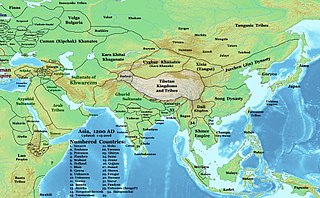
Hoysala literature is the large body of literature in the Kannada and Sanskrit languages produced by the Hoysala Empire (1025–1343) in what is now southern India. The empire was established by Nripa Kama II, came into political prominence during the rule of King Vishnuvardhana (1108–1152), and declined gradually after its defeat by the Khalji dynasty invaders in 1311.
Hampa Nagarajaiah, popularly known by his pen name Hampanā, is an Indian scholar in Kannada language and Jainism. He was born at Hampasandra Village located in Gowribidanur taluk, Chikkaballapura District in the Indian state of Karnataka. Hampanā is married to Kamala Hampana who also a veteran littérateur.

Jayanth Kaikini is a poet, short story writer, playwright, columnist in Kannada and a lyricist in Kannada cinema. He has so far published six anthologies of short stories, four books of poetry, three plays and a collection of essays. He is valued as one of the best writers in Kannada literature and has revolutionized the field by giving it a fresh new perspective. He has bagged in many notable awards like 'Karnataka Sahitya Academy' award. Kaikini is regarded as one of the most significant writers in Kannada today. Kaikini has been conferred the honorary doctorate from Tumkur University.

Sarvajna and Tiruvalluvar are popular Kannada and Tamil poets, respectively. Statues of Sarvajna in Tamil Nadu and Tiruvalluvar in Karnataka has been unveiled in August 2009 as a symbolic effort to bolster ties between the two Indian states, whose relationship has been strained by issues related to sharing of Kaveri water and Hogenakkal water supply power project.
Jadalathimmanahalli Krishnappa Srinivasa Murthy, known popularly as Srinivasa Murthy, is an Indian actor and television director. He is mostly known for his work as a director having made many television series in Kannada, beginning in 2001, based on the lives of various Kannada philosophers and poets, and adaptations of the works of popular Kannada writers. As an actor, he is known for his work in Kannada cinema, appearing often in supporting roles. He began his career as a stage artiste in both professional and amateur theatre, before taking to films in 1977.
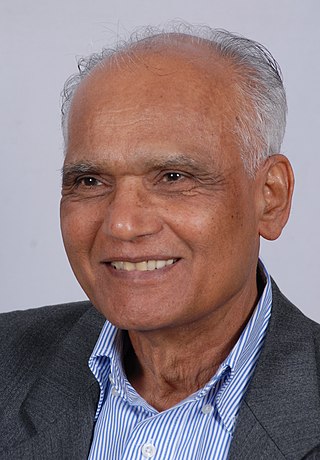
Santeshivara Lingannaiah Bhyrappa is an Indian novelist, philosopher and screenwriter who writes in Kannada. His work is popular in the state of Karnataka and he is widely regarded as one of modern India's popular novelists. His novels are unique in terms of theme, structure, and characterization. He has been among the top-selling authors in the Kannada language and his books have been translated into Hindi and Marathi which have also been sellers.

Sarvajña was a Kannada poet, pragmatist and philosopher of the 16th century. The word "Sarvajna" in Sanskrit literally means "the all knowing". His father was Kumbara Malla and his mother was Mallaladevi. His birth anniversary is celebrated on February 20 every year. He belongs to the caste of Kumbara. He is famous for his pithy three-lined poems called tripadi. He is also referred as Sarvagna in modern translation.














